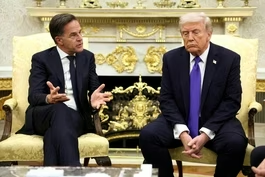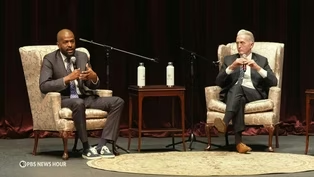
Why millions are facing a spike in health care costs
Clip: 10/22/2025 | 5m 43sVideo has Closed Captions
Why millions of Americans are facing a spike in health care costs
Millions of Americans are bracing themselves for a significant hike in their 2026 health insurance premiums without the subsidies at the center of the government shutdown battle. It comes as insurance costs are rising significantly throughout the country. A KFF survey found the average annual premium for a family increased 6% from the previous year. Amna Nawaz discussed more with Cynthia Cox.
Problems playing video? | Closed Captioning Feedback
Problems playing video? | Closed Captioning Feedback
Major corporate funding for the PBS News Hour is provided by BDO, BNSF, Consumer Cellular, American Cruise Lines, and Raymond James. Funding for the PBS NewsHour Weekend is provided by...

Why millions are facing a spike in health care costs
Clip: 10/22/2025 | 5m 43sVideo has Closed Captions
Millions of Americans are bracing themselves for a significant hike in their 2026 health insurance premiums without the subsidies at the center of the government shutdown battle. It comes as insurance costs are rising significantly throughout the country. A KFF survey found the average annual premium for a family increased 6% from the previous year. Amna Nawaz discussed more with Cynthia Cox.
Problems playing video? | Closed Captioning Feedback
How to Watch PBS News Hour
PBS News Hour is available to stream on pbs.org and the free PBS App, available on iPhone, Apple TV, Android TV, Android smartphones, Amazon Fire TV, Amazon Fire Tablet, Roku, Samsung Smart TV, and Vizio.
Providing Support for PBS.org
Learn Moreabout PBS online sponsorshipGEOFF BENNETT: Congress tonight remains at a stalemate as the government shutdown enters its fourth week, now the second longest in U.S.
history.
More than 700,000 federal workers are furloughed, and the impact is becoming clear.
Yesterday, in Prince George's County, Maryland, home to roughly 60,000 federal employees, aligned for a local food bank stretched around the block.
For now, no serious negotiations are under way to end the shutdown.
AMNA NAWAZ: And there's no movement yet on the central battle behind the shutdown.
That's the expiration of health care subsidies at the end of this year.
Millions of Americans are bracing themselves for a significant hike in their 2026 health insurance premiums without that subsidy help, an average of about 18 percent increase.
It comes as health insurance costs are rising significantly throughout the country.
A recent KFF survey found that the average annual premium for a family with workplace insurance reached nearly $27,000 in 2025.
That is a 6 percent increase from the previous year.
For more on the latest, I'm joined now by Cynthia Cox, vice president and director of the Program on the Affordable Care Act for KFF.
Cynthia, welcome.
Thanks for being here.
CYNTHIA COX, Program on the ACA Director, KFF: Thanks for having me.
AMNA NAWAZ: Just briefly remind us why these enhanced subsidies had an expiration date attached to them in the first place.
CYNTHIA COX: Yes, so these enhanced subsidies or enhanced tax credits look a lot like what Democrats have wanted for a long time, but they were passed as part of a COVID relief package.
So it was passed as a temporary measure.
And then it was expanded again as part of the Inflation Reduction Act.
But, again, it had an expiration date.
And so if Congress takes no action, these enhanced tax credits are set to expire at the end of this year.
AMNA NAWAZ: So, if or when they expire, depending on what happens here, when you look at who's even enrolled in these Obamacare marketplaces, who would be impacted?
CYNTHIA COX: Yes, so when we look at how much growth there's been -- and I should say the markets have doubled in size because of these enhanced tax credits.
It used to be that 11 or 12 million people bought this insurance.
Now it's 24 million.
When you look at that growth, it is concentrated in Southern red states.
So it's likely that a lot of Republican voters are actually going to be disproportionately affected by premium increases if these tax credits expire.
AMNA NAWAZ: So as these Obamacare prices are starting to become public now, we're hearing again from critics of those health insurance marketplaces that it is the law itself, it is the Affordable Care Act that's making insurance too expensive.
Is there truth to that?
CYNTHIA COX: So the Affordable Care Act did make insurance more expensive for people who buy it themselves.
That's because before the Affordable Care Act, insurance companies could deny somebody who had preexisting conditions or they didn't have to cover their treatment.
Now insurance companies have to cover people with preexisting conditions and they have to pay for their hospitalizations or drug treatments or whatever else.
Now the individual market or the Obamacare markets actually cost about the same as the employer market, or where people get their job-based health coverage.
It's just that when you get your coverage through work, your employer is paying a lot of that premium.
So people may not realize how expensive those premiums actually are for both people who get coverage through work and through the Obamacare markets.
AMNA NAWAZ: And we noted at the beginning of this conversation that increase we're seeing year over year in premiums.
What should we understand about what's driving that?
CYNTHIA COX: Yes, so health insurance premiums are really driven by the kind of underlying cost of health care.
That means doctor's visits, hospital stays, prescription drugs.
One of the things that's newer in the last year or so and also is a big thing to watch going forward are these newer drugs called GLP-1s, which are used to treat obesity.
That's like Ozempic, Wegovy.
And so these drugs are very expensive and a lot of people want to take them.
And that's actually raising costs for everybody.
AMNA NAWAZ: One of the other criticisms we hear from folks is that the enhanced subsidies, we know they didn't have an income cap attached to them.
And the criticism is that people who don't actually need the subsidy, people who live very comfortably making six-figure salaries also received it, and that's something that needs to be addressed.
Can you help us understand if that's true or not?
CYNTHIA COX: So these enhanced tax credits do phase out at higher incomes.
It's just that there's not a single income at which they phase out.
The reason for that is that it -- the way the law works is that you have to pay no more than 8.5 percent of your income for insurance.
So if your unsubsidized premium is less than that, then you don't get a subsidy.
If it's more than that, then you do get a subsidy.
So for an older couple, for example, where their premiums might be very high, they might get a subsidy even if they have a six-figure income.
AMNA NAWAZ: So it sounds like, as the insurance premiums are going up, the subsidies in many ways just make that affordable for people.
They can't afford it, in other words, without the subsidy.
What does it say to you about the long-term functioning of the Affordable Care Act if people can't afford to buy it without federal subsidies?
CYNTHIA COX: I mean, I think a legitimate criticism of the Affordable Care Act is that it made health care more affordable for certain people by using taxpayer dollars to offset the cost.
It doesn't do a lot to address the underlying reasons why health care is so expensive in this country, which really when you look at it is hospital costs, doctor's visits and prescription drug costs.
That could be a place to look going forward.
AMNA NAWAZ: So we noted that roughly average 18 percent increase if nothing changes here.
What should people be bracing for if the subsidies are not renewed or extended?
CYNTHIA COX: So, the amount of the insurers are charging is going up 18 percent, but because people will be getting less financial help, how much they pay for their monthly premium payment will actually go up by 114 percent on average if the enhanced tax credits expire.
AMNA NAWAZ: Cynthia Cox of KFF, thank you very much for joining us.
Appreciate your time and expertise.
CYNTHIA COX: Thank you.
AI content spreads confusion and misinformation, critics say
Video has Closed Captions
Clip: 10/22/2025 | 5m 58s | AI content supercharges confusion and spreads misleading information, critics warn (5m 58s)
News Wrap: East Wing undergoing renovation for ballroom
Video has Closed Captions
Clip: 10/22/2025 | 4m 21s | News Wrap: White House says entirety of East Wing undergoing renovation for ballroom (4m 21s)
Nicholas Sparks co-authors new novel with M. Night Shyamalan
Video has Closed Captions
Clip: 10/22/2025 | 8m 3s | Nicholas Sparks teams up with M. Night Shyamalan to co-author supernatural love story (8m 3s)
Teen with disabilities mistakenly held in immigration raid
Video has Closed Captions
Clip: 10/22/2025 | 7m 48s | Mother speaks out after teen with disabilities mistakenly arrested in immigration raid (7m 48s)
Trump sanctions Russian oil companies as peace talks falter
Video has Closed Captions
Clip: 10/22/2025 | 4m | Trump sanctions Russian oil companies as his efforts to end Ukraine war falter (4m)
U.S. ranchers push back on Trump’s Argentina beef deal
Video has Closed Captions
Clip: 10/22/2025 | 5m 32s | 'This is going to hurt us': U.S. ranchers push back on Trump’s Argentina beef deal (5m 32s)
Viral debates and their impact on our ability to disagree
Video has Closed Captions
Clip: 10/22/2025 | 9m 54s | The rise of viral debate videos and their impact on our ability to disagree (9m 54s)
Providing Support for PBS.org
Learn Moreabout PBS online sponsorship
- News and Public Affairs

FRONTLINE is investigative journalism that questions, explains and changes our world.

- News and Public Affairs

Amanpour and Company features conversations with leaders and decision makers.












Support for PBS provided by:
Major corporate funding for the PBS News Hour is provided by BDO, BNSF, Consumer Cellular, American Cruise Lines, and Raymond James. Funding for the PBS NewsHour Weekend is provided by...






